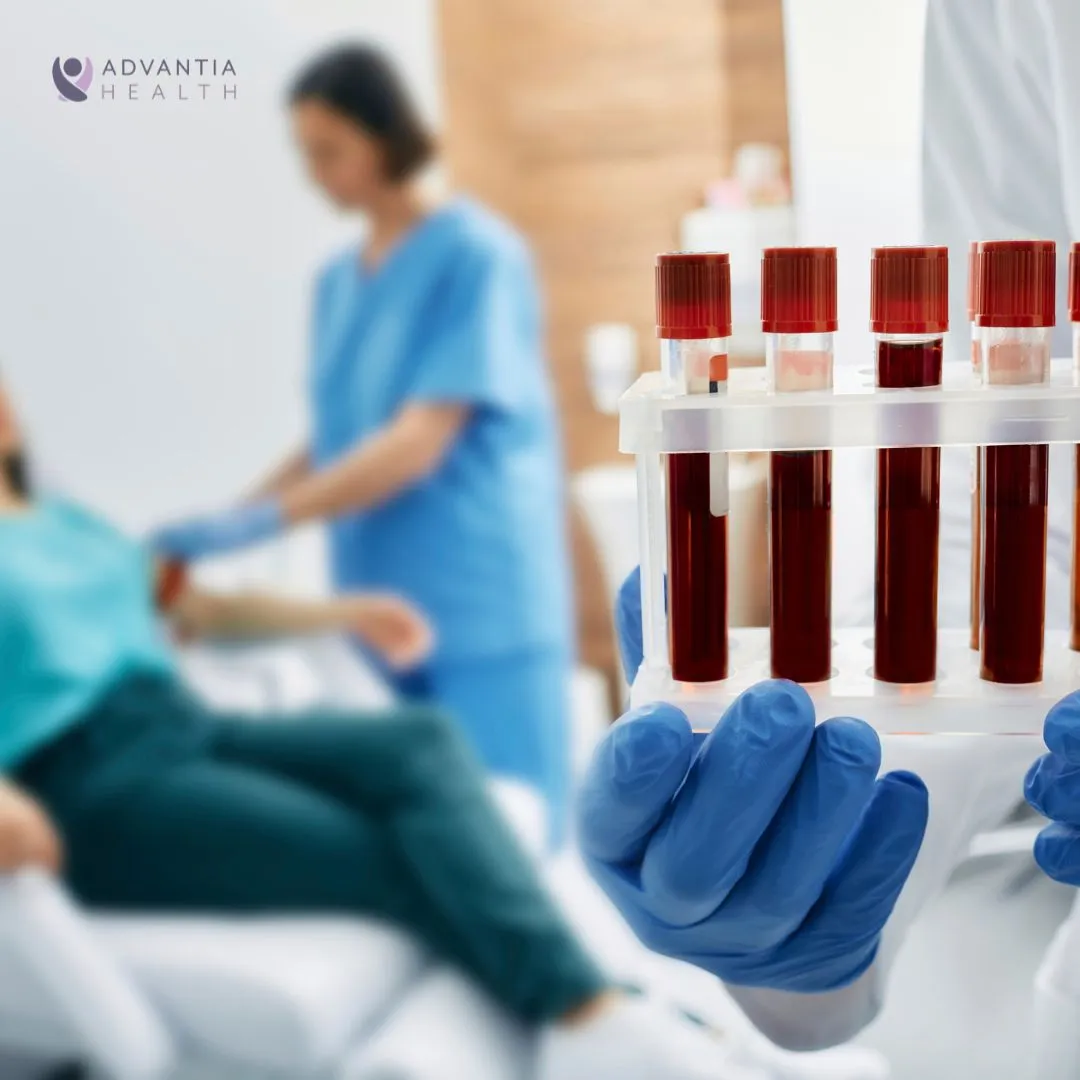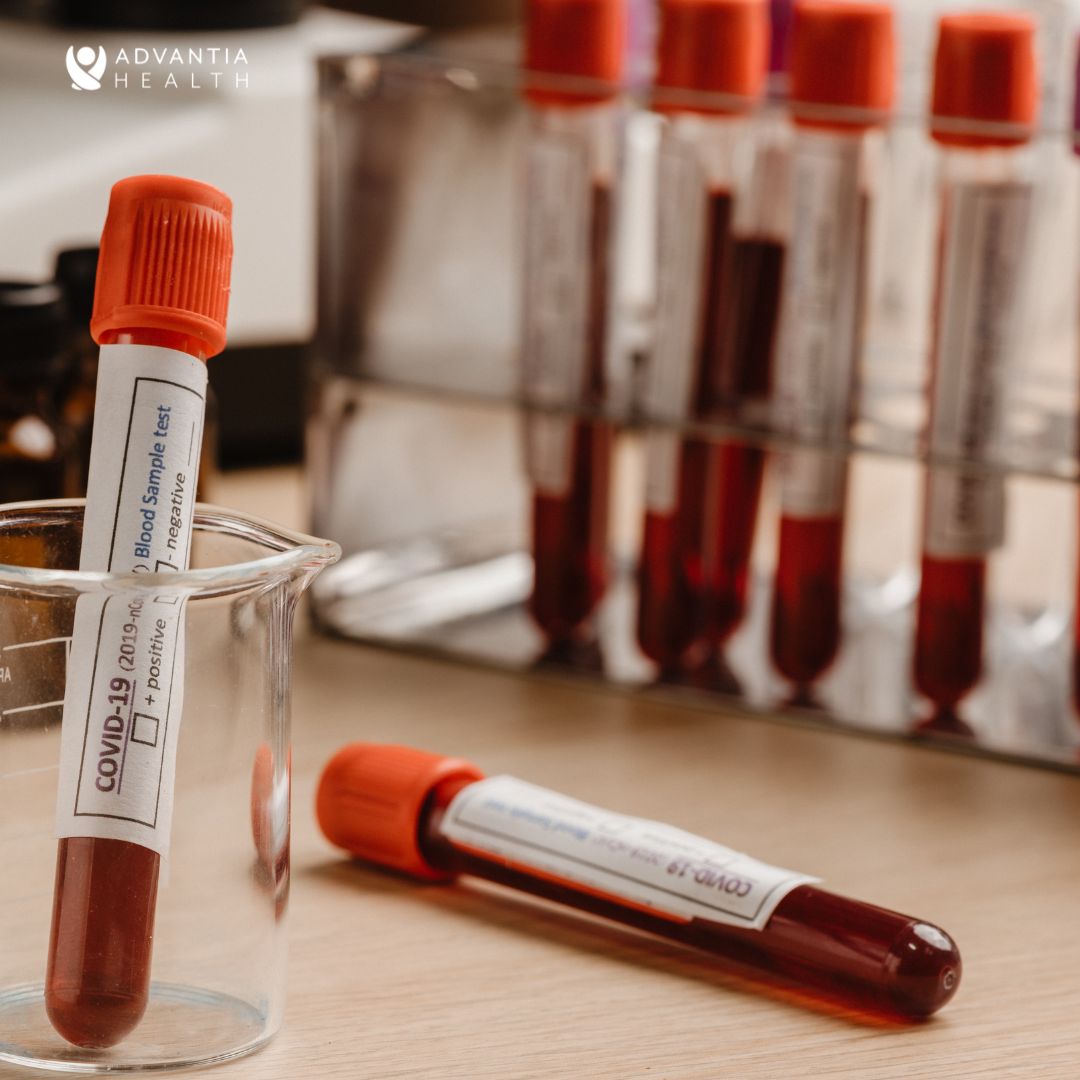
Published on: 30 April, 2024
Read Time: 14 min
As a woman, taking charge of your health means staying informed about the common lab tests that can help monitor and manage your well-being. Lab tests are valuable tools that provide insight into your overall health, reproductive wellness, hormone levels, and potential risk factors for diseases.
In this comprehensive guide, Advantia Health simplifies common lab tests, providing you with the essential knowledge to make informed health decisions.
If you have any questions or concerns about your health or any of the tests mentioned, don’t hesitate to reach out to one of our providers. We are here to address any health questions and offer the support you need to make informed decisions about your well-being.
Common Lab Tests at Advantia Health
Complete Blood Count (CBC)
The Complete Blood Count (CBC) test is a fundamental tool for assessing overall health. This comprehensive test evaluates various components of your blood, such as red blood cells, which are responsible for carrying oxygen throughout your body; white blood cells, which help fight infections and monitor immune functions; and platelets, which are essential for clotting and wound healing. Additionally, the CBC measures hemoglobin, the protein in red blood cells that carries oxygen, and hematocrit, which indicates the proportion of red blood cells in your blood.
By detecting abnormalities in these components, the CBC can help identify conditions like anemia, infections, inflammation, and even more severe conditions like leukemia. This information assists our healthcare professionals in guiding your medical care and recommending further testing if needed.
Comprehensive Metabolic Panel (CMP-14)
The CMP-14 combines various tests to assess your body’s metabolic function, organ health, and electrolyte balance. It includes measurements of blood glucose, kidney function, liver function, and electrolyte levels.
This panel offers valuable insights into your health and helps identify issues related to diabetes, liver disease, kidney function, and more.
Lipid Panel
The Lipid Panel is an essential diagnostic tool that gauges your cholesterol and triglyceride levels, fundamental markers of your cardiovascular health. This test includes an analysis of total cholesterol, LDL cholesterol—commonly known as “bad” cholesterol due to its role in arterial blockage, HDL cholesterol—termed “good” cholesterol because it helps remove other forms of cholesterol from the bloodstream, and triglycerides, which at high levels are associated with atherosclerosis. This condition hardens arteries and can impede cardiac function.
By tracking these levels, the Advantia Health team can assess your risk for heart disease and stroke and guide interventions to maintain or improve your heart health.
Thyroid Tests
The thyroid, a small gland located in your neck, is essential for regulating metabolism, energy production, and mood. Our thyroid panels, which measure levels of thyroid-stimulating hormone (TSH) and thyroxine (T4), are crucial for identifying and managing various thyroid-related conditions, including hyperthyroidism and hypothyroidism.
By understanding these hormone levels, our healthcare professionals can effectively diagnose thyroid issues and create tailored treatment plans. This approach ensures the optimal functioning of your body’s metabolic processes, enhancing your overall health and well-being.
Hemoglobin A1C
The Hemoglobin A1C test, offered by Advantia Health, is a critical measure of long-term blood sugar control and an indispensable tool in the management of diabetes. This test calculates your average blood sugar levels over the last two to three months by assessing the percentage of your hemoglobin—a protein in red blood cells responsible for oxygen transport—that is glycated, or coated with sugar.
Understanding these levels is crucial for diagnosing and monitoring diabetes and assessing the risk of diabetes-related complications such as heart disease, kidney disease, and nerve damage.
Vitamin D3
Advantia Health’s Vitamin D3 test measures the level of Vitamin D3 in your blood, crucial for maintaining bone health, immune function, and overall well-being. Vitamin D3, often referred to as the sunshine vitamin, is vital for the absorption of calcium, supporting healthy bone formation and preventing bone disorders. It also plays a significant role in reducing inflammation and aiding the function of muscles and the nervous system.
A deficiency in Vitamin D3 can lead to weakened bones and compromised immune responses, and is often caused by inadequate sunlight exposure, poor dietary intake, or medical conditions that affect absorption. This test helps determine if you have sufficient Vitamin D3, guiding necessary dietary or lifestyle adjustments to enhance your health.
Vitamin B12
At Advantia Health, we use the Vitamin B12 test to check the amount of Vitamin B12 in your blood. This vitamin is essential for healthy nerves, making red blood cells, and building DNA. Low levels of Vitamin B12 can cause anemia and can also lead to nerve damage.
Reasons for low Vitamin B12 include not getting enough from your diet, certain health conditions that affect how well your body absorbs nutrients, or the use of specific medications. This test helps us find out if you have a deficiency so we can start treatments to improve your health and prevent more serious problems.
Ferritin
At Advantia Health, the Ferritin test measures the ferritin levels in your blood. Ferritin is a protein that stores iron in your cells, playing a key role in your overall health. This test is important for checking if you have the right amount of iron in your body.
Low ferritin levels often mean your iron is too low, which can lead to iron deficiency anemia—a condition where you don’t have enough healthy red blood cells. High levels of ferritin may suggest inflammation and could be related to various conditions such as liver disease, rheumatoid arthritis, an overactive thyroid, or certain cancers. Understanding your ferritin levels helps doctors diagnose these issues and plan the best treatment.
Iron and Total Iron-Binding Capacity (TIBC)
The Iron and Total Iron-Binding Capacity (TIBC) test at Advantia Health evaluates both the amount of iron in your blood and your body’s ability to transport iron. This dual assessment is needed for diagnosing conditions like iron deficiency anemia and understanding overall iron metabolism.
The TIBC test measures the total iron-binding capacity, which indicates how much transferrin—a protein made by the liver that transports iron—is available to bind with iron. Additionally, the test looks at unsaturated iron-binding capacity (UIBC), which quantifies transferrin not yet bound to iron. Together, these measurements help determine how well iron is functioning in your body, essential for the production of red blood cells and hemoglobin, the protein that carries oxygen through the blood.

Sexual and Reproductive Health Tests
Pap Smear
A Pap Smear is a vital screening test for cervical cancer. It involves collecting cells from the cervix, which is the lower, narrow end of the uterus located at the top of the vagina. This test is crucial for the early detection of abnormal cervical cells that may indicate the presence of or potential for developing cervical cancer.
Regular Pap smears are essential for women as part of preventive healthcare, significantly increasing the chances of early detection and effective treatment of cervical cancer.
HPV Test
Human papillomavirus (HPV) testing is often performed in conjunction with Pap smears to screen for high-risk HPV strains that can lead to cervical cancer. This test offers additional information about the presence of HPV infection, aiding in early intervention and monitoring. Click here to read more about the HPV vaccine.
Chlamydia Screening
Advantia Health offers Chlamydia screening to detect the presence of Chlamydia trachomatis, a common sexually transmitted infection (STI).
Testing involves collecting a sample—typically urine or a swab from the vagina, penis, or rectum—which is then analyzed in a laboratory. The infection is particularly challenging because it often presents no noticeable symptoms, making regular screenings important for sexual health. Early detection through our Chlamydia test allows for effective treatment with antibiotics, preventing severe health issues and reducing the risk of transmission.
Gonorrhea Screening
Gonorrhea screenings are conducted by Advantia Health to detect the presence of Neisseria gonorrhoeae, the bacteria that causes this sexually transmitted infection (STI). The test typically involves a simple urine sample or a swab from areas like the urethra, cervix, or rectum.
Identifying gonorrhea early is crucial because if left untreated, it can lead to serious complications including pelvic inflammatory disease and infertility. Our screenings use highly accurate tests to ensure effective diagnosis and treatment, helping to prevent the spread of the infection and manage any health issues promptly.
Syphilis
Advantia Health provides testing for syphilis, a sexually transmitted infection caused by bacteria. Detecting syphilis early is crucial as it can lead to severe complications involving the heart, brain, and other organs if untreated. The test primarily uses a blood sample to detect antibodies that the body produces in response to the infection, indicating whether someone has a current or past infection.
In some cases, fluid from sores or cerebrospinal fluid may be tested, especially if there are concerns about complications affecting the nervous system. Early diagnosis and treatment with antibiotics can prevent the progression of the disease and reduce the risk of spreading it to others.
HIV
Advantia Health offers HIV testing to detect the human immunodeficiency virus (HIV), which can progress to AIDS if untreated. Early diagnosis is crucial for effective management and initiating timely treatment. Our testing methods include rapid tests that can provide preliminary results in as little as 20 minutes and more comprehensive lab-based tests.
During the early “window period” between exposure and when antibodies become detectable, there is a high risk of transmission. Positive initial results require confirmatory testing. Understanding your HIV status early enables you to start antiretroviral therapy (ART) promptly, greatly improving health outcomes and reducing transmission risk.
Hepatitis B
Advantia Health provides testing for Hepatitis B, a virus that can cause severe liver damage and inflammation if not managed early. Our blood tests identify the Hepatitis B virus (HBV) and determine if the infection is new (acute) or long-term (chronic). We also use tools like liver ultrasound or transient elastography to check the health of the liver and the extent of any damage. These tests are crucial for diagnosing current or past infections and determining if someone has immunity to the virus. Understanding the type and stage of infection is key to treating and preventing serious health issues linked to Hepatitis B.
Hepatitis C
The Hepatitis C test at Advantia Health is designed to detect the presence of the hepatitis C virus (HCV) in the blood. If left untreated, Hepatitis C can lead to chronic liver disease and other severe health problems. The initial test, known as the HCV antibody test, checks for antibodies to the virus, indicating whether someone has ever been infected. Many people with Hepatitis C do not show symptoms, which is why routine testing is important, especially if liver enzyme levels are high, suggesting an infection. Further tests may follow to confirm the diagnosis. Regular screening is essential to manage and prevent the progression of the disease effectively.

Tests During Pregnancy
Beta hCG
The Beta hCG test measures levels of human chorionic gonadotropin (hCG) in the blood, a hormone produced shortly after conception. This test is crucial for confirming pregnancy and monitoring its progression. Unlike urine pregnancy tests that can be affected by factors like dehydration, the Beta hCG blood test provides accurate results even at very low hCG levels.
It is particularly useful in confirming pregnancy as early as 11 days post-conception and in monitoring hCG levels to assess the health and development of the pregnancy. Increasing hCG levels typically indicate a normal pregnancy, while measurements taken over time can help evaluate the pregnancy’s progress and assess the effectiveness of fertility treatments.
Click here to read our Pregnancy section of the blog.
ABO/Rh Typing
The ABO/Rh typing tests determine blood type and Rh factor to ensure compatibility between the mother and the fetus during pregnancy. These tests identify whether the mother’s blood has the Rh factor protein, which is critical because differences between the mother’s Rh status and the fetus’s can lead to complications. Most people are Rh positive, but if a mother is Rh negative and the baby is Rh positive, this is called Rh incompatibility.
The tests also include antibody screening to detect special proteins that might harm the baby if the mother and baby’s blood types don’t match. Conducted early in pregnancy, these screenings help manage potential risks associated with blood type and Rh factor differences, ensuring careful monitoring and treatment to protect the baby’s health.
Immunity Tests
- Rubella: The Rubella test assesses immunity to the rubella virus. During pregnancy, immunity is crucial to prevent fetal rubella syndrome, which can lead to birth defects.
- Varicella: This test assesses immunity to the varicella-zoster virus, which causes chickenpox. Immunity is critical, especially during pregnancy, to avoid potential complications.
- Parvovirus: This test checks for immunity to Parvovirus B19, which can cause serious complications in pregnant women and individuals with weakened immune systems.
- Toxoplasmosis: This test measures immunity to Toxoplasma gondii. In pregnant women, the presence of Toxoplasma infection can pose risks to the unborn child, making immunity screening important.
Gestational Diabetes Testing
Advantia Health conducts gestational diabetes testing to monitor blood sugar levels during pregnancy. This condition, which can impact both the mother and baby, is typically checked between the 24th and 28th weeks of pregnancy. High-risk individuals, such as those with a family history of diabetes or previous gestational diabetes, may be tested earlier.
The testing often starts with a glucose challenge test where you drink a sugary solution and have your blood sugar measured after one hour to see how well your body processes glucose. If the results suggest a potential for gestational diabetes, further testing, like the oral glucose tolerance test, may be necessary to confirm the diagnosis.
Group B Streptococcus (GBS) Screening
Advantia Health performs Group B Streptococcus (GBS) screening to detect the presence of GBS bacteria in pregnant women. This bacteria can be passed to the newborn during childbirth and lead to serious complications. Screening typically occurs between weeks 35 and 37 of pregnancy.
The process involves a simple, painless swab of the vagina and rectum to collect samples, which are then cultured in a lab to check for GBS. If GBS is detected, antibiotics can be administered during delivery to prevent transmission to the baby. This screening is essential even for those planning a Cesarean delivery in case of early labor or water breaking.

Hormone Tests
Estradiol, FSH, LH, and Prolactin
Hormone tests help in evaluating reproductive and overall health. Estradiol, FSH (follicle-stimulating hormone), LH (luteinizing hormone), and prolactin tests play a crucial role in assessing menstrual irregularities, fertility issues, and hormonal imbalances.
Why are hormones tested?
Hormones play a vital role in various bodily functions, including growth, metabolism, mood regulation, and reproductive processes. Monitoring hormone levels can provide insights into fertility issues, menstrual irregularities, menopausal symptoms, and certain health conditions.
By assessing these hormone levels, healthcare providers can make informed decisions about treatment plans, reproductive health, and overall well-being. Hormone testing is fundamental in diagnosing and managing conditions related to hormonal imbalances, providing valuable information for personalized care and treatment strategies.
Tests for Common Infections
Urine Culture
Urine culture tests are used to identify and determine the specific microorganisms, such as bacteria or yeast, that are causing a urinary tract infection (UTI). The test involves analyzing a urine sample to detect these pathogens. If pathogens are found, an antibiotic sensitivity test may be conducted to find the most effective antibiotic treatment. This test is especially crucial for patients experiencing chronic or recurrent UTIs, as it helps tailor the treatment to effectively combat the infection. Symptoms prompting this test can include a burning sensation during urination or frequent urges to urinate with little success, which might indicate a more severe infection if accompanied by fever or abdominal pain.
Vaginitis DNA Probe
This test uses molecular techniques to detect and identify common pathogens causing vaginitis, helping to diagnose and manage vaginal infections effectively.
Summary
Each of these common lab tests plays a vital role in maintaining health, managing reproductive wellness, and addressing potential health concerns. By understanding their significance, you are empowered to take control of your health and well-being.
Incorporating these tests into your routine healthcare provides valuable insights and helps address arising concerns. Regular discussions with your healthcare provider about these tests and their implications can significantly contribute to proactive healthcare management. Remember, Advantia Health providers are here to help you navigate through these tests and tailor a personalized healthcare plan that meets your specific needs.
Stay informed, stay empowered, and take charge of your health! Remember, when in doubt, always consult your women’s health provider for personalized guidance tailored to your unique health needs.





